Related Research Articles
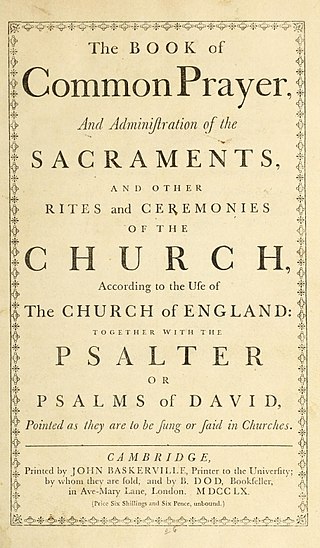
The Book of Common Prayer (BCP) is the name given to a number of related prayer books used in the Anglican Communion and by other Christian churches historically related to Anglicanism. The first prayer book, published in 1549 in the reign of King Edward VI of England, was a product of the English Reformation following the break with Rome. The work of 1549 was the first prayer book to include the complete forms of service for daily and Sunday worship in English. It contained Morning Prayer, Evening Prayer, the Litany, and Holy Communion and also the occasional services in full: the orders for Baptism, Confirmation, Marriage, "prayers to be said with the sick", and a funeral service. It also set out in full the "propers" : the introits, collects, and epistle and gospel readings for the Sunday service of Holy Communion. Old Testament and New Testament readings for daily prayer were specified in tabular format as were the Psalms and canticles, mostly biblical, that were provided to be said or sung between the readings.
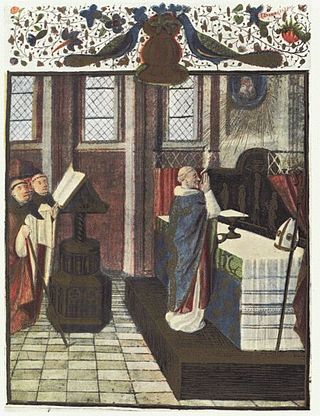
Mass is the main Eucharistic liturgical service in many forms of Western Christianity. The term Mass is commonly used in the Catholic Church, Western Rite Orthodoxy, Old Catholicism, and Independent Catholicism. The term is also used in some Lutheran churches, as well as in some Anglican churches, and on rare occasion by other Protestant churches.
The collect is a short general prayer of a particular structure used in Christian liturgy.
Christian liturgy is a pattern for worship used by a Christian congregation or denomination on a regular basis. The term liturgy comes from Greek and means "public work". Within Christianity, liturgies descending from the same region, denomination, or culture are described as ritual families.

Anglican eucharistic theology is diverse in practice, reflecting the comprehensiveness of Anglicanism. Its sources include prayer book rubrics, writings on sacramental theology by Anglican divines, and the regulations and orientations of ecclesiastical provinces. The principal source material is the Book of Common Prayer, specifically its eucharistic prayers and Article XXVIII of the Thirty-Nine Articles. Article XXVIII comprises the foundational Anglican doctrinal statement about the Eucharist, although its interpretation varies among churches of the Anglican Communion and in different traditions of churchmanship such as Anglo-Catholicism and Evangelical Anglicanism.
The Prayer of Humble Access is the name traditionally given to a prayer contained in many Anglican, Methodist, Presbyterian, and other Christian eucharistic liturgies. Its origins lie in the healing the centurion's servant as recounted in two of the Gospels. It is comparable to the Domine, non sum dignus long used in the Catholic Mass; it is used by the personal ordinariates established for former Anglican groups reconciled to the Catholic Church.

The 1928 Book of Common Prayer, sometimes known as the Deposited Book, is a liturgical book which was proposed as a revised version of the Church of England's 1662 Book of Common Prayer. Opposing what they saw as an Anglo-Catholic revision that would align the Church of England with the Catholic Church—particularly through expanding the practice of the reserved sacrament—Protestant evangelicals and nonconformists in Parliament put up significant resistance, driving what became known as the Prayer Book Crisis.
The Daily Office in Anglican churches focuses the traditional canonical hours on daily services of Morning Prayer and Evening Prayer, usually following the Book of Common Prayer. As in other Christian traditions, either clergy or laity can lead the daily office. Most Anglican clergy are required to pray Morning and Evening Prayer daily.
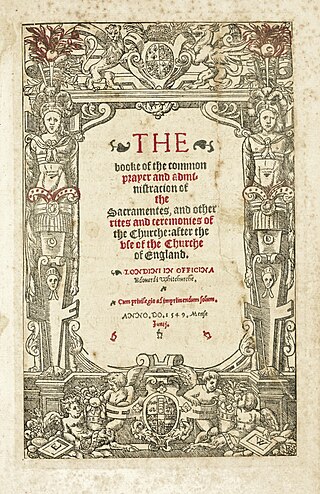
The 1549 Book of Common Prayer (BCP) is the original version of the Book of Common Prayer, variations of which are still in use as the official liturgical book of the Church of England and other Anglican churches. Written during the English Reformation, the prayer book was largely the work of Thomas Cranmer, who borrowed from a large number of other sources. Evidence of Cranmer's Protestant theology can be seen throughout the book; however, the services maintain the traditional forms and sacramental language inherited from medieval Catholic liturgies. Criticised by Protestants for being too traditional, it was replaced by the significantly revised 1552 Book of Common Prayer.

The 1979 Book of Common Prayer is the official primary liturgical book of the U.S.-based Episcopal Church. An edition in the same tradition as other versions of the Book of Common Prayer used by the churches within the Anglican Communion and Anglicanism generally, it contains both the forms of the Eucharistic liturgy and the Daily Office, as well as additional public liturgies and personal devotions. It is the fourth major revision of the Book of Common Prayer adopted by the Episcopal Church, and succeeded the 1928 edition. The 1979 Book of Common Prayer has been translated into multiple languages and is considered a representative production of the 20th-century Liturgical Movement.
Protestant liturgy or Evangelical liturgy is a pattern for worship used by a Protestant congregation or denomination on a regular basis. The term liturgy comes from Greek and means "public work". Liturgy is especially important in the Historical Protestant churches, both mainline and evangelical, while Baptist, Pentecostal, and nondenominational churches tend to be very flexible and in some cases have no liturgy at all. It often but not exclusively occurs on Sunday.

The 1929 Scottish Prayer Book is an official liturgical book of the Scotland-based Scottish Episcopal Church. The 1929 edition follows from the same tradition of other versions of the Book of Common Prayer used by the churches within the Anglican Communion and Anglicanism generally, with the unique liturgical tradition of Scottish Anglicanism. It contains both the forms of the Eucharistic liturgy and Daily Office, as well as additional public liturgies and personal devotions. The second major revision of the Book of Common Prayer following the full independence of the Scottish Episcopal Church, the 1929 Scottish Prayer Book succeeded the 1912 edition and was intended to serve alongside the Church of England's 1662 prayer book.
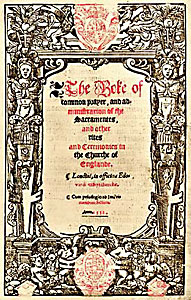
The 1552 Book of Common Prayer, also called the Second Prayer Book of Edward VI, was the second version of the Book of Common Prayer (BCP) and contained the official liturgy of the Church of England from November 1552 until July 1553. The first Book of Common Prayer was issued in 1549 as part of the English Reformation, but Protestants criticised it for being too similar to traditional Roman Catholic services. The 1552 prayer book was revised to be explicitly Reformed in its theology.

The 1962 Book of Common Prayer is an authorized liturgical book of the Canada-based Anglican Church of Canada. The 1962 prayer book is often also considered the 1959 prayer book, in reference to the year the revision was first approved for an "indefinite period" of use beginning in 1960. The 1962 edition follows from the same tradition of other versions of the Book of Common Prayer used by the churches within the Anglican Communion and Anglicanism generally. It contains both the Eucharistic liturgy and Daily Office, as well as additional public liturgies and personal devotions. The second major revision of the Book of Common Prayer of the Anglican Church of Canada, the 1962 Book of Common Prayer succeeded the 1918 edition, which itself had replaced the Church of England's 1662 prayer book. While supplanted by the 1985 Book of Alternative Services as the Anglican Church of Canada's primary Sunday service book, the 1962 prayer book continues to see usage.
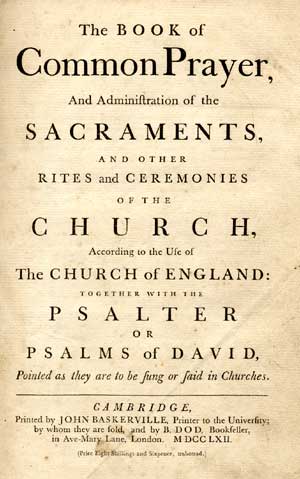
The 1662 Book of Common Prayer is an authorised liturgical book of the Church of England and other Anglican bodies around the world. In continuous print and regular use for over 360 years, the 1662 prayer book is the basis for numerous other editions of the Book of Common Prayer and other liturgical texts. Noted for both its devotional and literary quality, the 1662 prayer book has influenced the English language, with its use alongside the King James Version of the Bible contributing to an increase in literacy from the 16th to the 20th century.
Anglican liturgy usually refers to liturgies according the Book of Common Prayer and its derivatives. It may also refer to the following liturgies and liturgical books used by churches and groups in the Anglican Christian tradition:
An ordinal, in a modern context, is a liturgical book that contains the rites and prayers for the ordination and consecration to the Holy Orders of deacons, priests, and bishops in multiple Christian denominations, especially the Edwardine Ordinals within Anglicanism. The term "ordinal" has been applied to the prayers and ceremonies for ordinations in the Catholic Church, where the pontificals of the Latin liturgical rites typically compile them along with other liturgies exclusive to bishops. In medieval liturgies, ordinals supplied instruction on how to use the various books necessary to celebrate a liturgy and added rubrical direction.

The Edwardine Ordinals are two ordinals primarily written by Thomas Cranmer as influenced by Martin Bucer and first published under Edward VI, the first in 1550 and the second in 1552, for the Church of England. Both liturgical books were intended to replace the ordination liturgies contained within medieval pontificals in use before the English Reformation. The 1550 ordinal was authorized following the introduction of the first Book of Common Prayer a year prior and the 1552 ordinal's introduction coincided with the second Book of Common Prayer–both also largely prepared by Cranmer. The ordinals provided the basis for most Anglican ordination rites until the 20th century and contributed to the development of the Anglican priesthood from "sacerdotal" and "intercessory" into a "preaching, catechizing, and protestant ministry". They also formed the basis for both the Vestiarian Controversy and, much later, some of the debate over the validity of Anglican Holy Orders and the subsequent 1896 papal bull Apostolicae curae where they were declared "absolutely null and utterly void" by the Catholic Church.
The 1928 Book of Common Prayer was the official primary liturgical book of the U.S.-based Episcopal Church from 1928 to 1979. An edition in the same tradition as other versions of the Book of Common Prayer used by the churches within the Anglican Communion and Anglicanism generally, it contains both the forms of the Eucharistic liturgy and the Daily Office, as well as additional public liturgies and personal devotions. It was the third major revision of the Book of Common Prayer adopted by the Episcopal Church, succeeding the 1892 edition and being replaced by the 1979 Book of Common Prayer.

The 1637 Book of Common Prayer, commonly known as the Scottish Prayer Book or Scottish liturgy, was an version of the English Book of Common Prayer revised for use by the Church of Scotland. A text sharing much with the 1549 English prayer book–rather than later, more reformed revisions–and Laudian liturgical preferences with some concessions to a Scottish and Presbyterian audience, Charles I, as King of Scotland and England wished to impose the liturgical book to align Scottish worship with that of the Church of England. However, after a coordinated series of protests including that of Jenny Geddes at St Giles' Cathedral, the 1637 prayer book was rejected.
References
- 1 2 Hefling, Charles; Shattuck, Cynthia, eds. (2006). "Glossary". The Oxford Guide to The Book of Common Prayer: A Worldwide Survey. Oxford: Oxford University Press. p. 578. ISBN 978-0-19-529762-1.
- 1 2 Armentrout, Don S.; Slocum, Robert Boak, eds. (2000). "Sentences (Opening)". An Episcopal Dictionary of the Church: A User Friendly Reference for Episcopalians. New York City: Church Publishing Incorporated. Retrieved 28 June 2023– via The Episcopal Church.
- ↑ Davies, J. G. (1986). "Sentences". In Davies, J. G. (ed.). The New Westminster Dictionary of Liturgy and Worship. Westminster Press. p. 484. ISBN 0-664-21270-0.
- 1 2 Cuming, G. J. (1969). A History of Anglican Liturgy (First ed.). Macmillan and Co Ltd. LCCN 69-15582.
- ↑ Strout, Shawn O. (2023). Of Thine Own Have We Given Thee: A Liturgical Theology of the Offertory in Anglicanism. Wipf and Stock. p. 92. ISBN 9781666735864 – via Google Books.